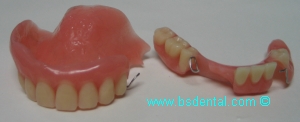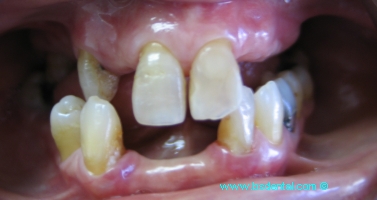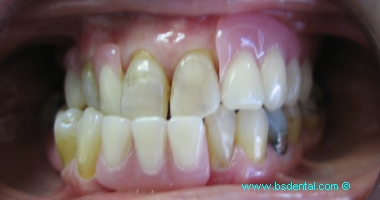REMOVABLE DENTURES - PARTIAL and FULL
A denture is an appliance which is worn to replace lost or missing teeth.
This will enable you to enjoy a healthy diet and smile with confidence.
Replacing lost or missing teeth has substantial benefits for your health and appearance.
A Partial Denture is one which fills in the spaces created by lost or missing teeth and
could be attached to your natural teeth with metal clasps.
A Complete or Full Denture is one which replaces all of the natural teeth in either the upper or lower jaws.
A complete or full denture also provides support for your cheeks and lips.
Without this support, sagging facial muscles can make a person appear older and
reduce their ability to eat and speak.
Dentures can be made to closely resemble your natural teeth
so that changes in appearance will be hardly noticeable.
Today's modern dentures can drastically improve the look of your smile and
help fill out the appearance of your face.
The base of a denture is called a plate and can be made of either acrylic (plastic) or metal.
The teeth are normally made of acrylic and can be made to match your natural teeth.
Eating will take a little practice. Start with soft foods cut into small pieces. Chew slowly using both sides of your mouth at the same time to prevent the denture from moving. As you become more used to your denture, add other foods until you return to your normal healthy diet.
Pronouncing certain words may require practice. Reading out loud and repeating difficult words will help.
If you find that your dentures occasionally slip when you laugh, cough or smile, reposition the denture by gently biting down and swallowing.
During the first few days, you may be advised to wear them for most of the time, including while you are asleep. After an initial period of adjustment your dentist may advise that you remove them before going to bed. This allows your gums to rest and helps promote oral health.
Dentures are custom made to fit your mouth and a denture fixative should not be necessary. However, over a period, dentures may become loose and ill-fitting and a fixative may be used for a short period prior to having them replaced. A poorly fitting denture may cause irritation and possible sores, this can often happen if you have worn Immediate Dentures for some time.
Even with full dentures, you still need to take good care of your mouth. Every morning and evening, brush your gums, tongue and palate (roof of your mouth) with a soft –bristled brush. This removes plaque and stimulates circulation in the mouth. It is vitally important that partial denture wearers brush their teeth thoroughly every day to prevent tooth decay and gum disease that can lead to further teeth being lost.
Conventional dentures are made and inserted after teeth have been removed and the tissues have healed. Healing may take several months.
Immediate Dentures are inserted immediately after teeth have been removed. To do this, the dentist takes measurements and impressions of your mouth during a preliminary visit
An advantage of Immediate Dentures is that the wearer does not have to be without teeth during the healing period. However, bone and gums can shrink over time, especially during the first six months after teeth have been removed. When gums shrink, Immediate Dentures may require relining or even replacing to fit properly.
New dentures may feel awkward or even uncomfortable for a few weeks until you become accustomed to them. The dentures may feel loose while the muscles of your cheek and tongue learn to keep them in place. Should this continue, consult your dentist.
It is not unusual to experience minor irritation or soreness during this period. You may also find that saliva flow temporarily increases. As your mouth becomes accustomed to the dentures, these problems should diminish. If any problems persist, particularly irritation or soreness, be sure to consult your dentist
Dentures are very delicate and may break if dropped. When cleaning dentures it is recommended that you do so over a folded towel or sink of water. When you are not wearing your dentures, they should be stored in a container containing enough water to cover them.
Like natural teeth, dentures must be brushed daily to remove food debris and plaque. Brushing helps prevent dentures becoming stained and helps your mouth stay healthy. There are special denture cleaning brushes available but a soft bristled toothbrush can also be used. Avoid using hard-bristled brushes which can cause damage.
The use of an effervescent denture cleaner will help remove stubborn stains and leave your denture feeling fresher.
Over a period of time, dentures will need to be relined or re-made due to normal wear or a change in the shape of your mouth. Bone and gum ridges can recede or shrink causing jaws to align differently. Loose dentures can cause health problems, including sores and infections not to mention discomfort. A loose or ill-fitting denture can also make eating and speaking more difficult. It is important to replace worn or poorly fitting dentures before they cause problems.
Regular dental check-ups and having your teeth professionally cleaned are vital for maintaining healthy teeth and gums, most dentists recommend that under normal circumstances this should be done every 6 months. Full denture wearers should consult their dentist as to the frequency of visits.
With regular professional care, a positive attitude and persistence, you can lead a healthy lifestyle and have a great a smile.
Case 1 : PARTIAL DENTURE (Upper and Lower)
BEFORE TREATMENT :

AFTER TREATMENT :


Case 2 : PARTIAL DENTURE (Upper and Lower)
BEFORE TREATMENT :

AFTER TREATMENT :
